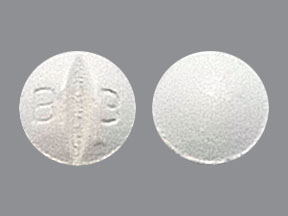
Bisoprolol Coupons & Savings Card – Discount Prices from $30.01
Bisoprolol is a medication prescribed to manage high blood pressure, either alone or alongside other treatments. This drug is part of the beta blocker class and functions by obstructing the effects of certain natural chemicals, like epinephrine, on your heart and blood vessels. As a result, bisoprolol helps to reduce heart rate, lower blood pressure, and ease the heart's workload. By effectively controlling high blood pressure, bisoprolol plays a critical role in minimizing the risk of strokes, heart attacks, and kidney issues. While commonly well-tolerated, some users may experience side effects such as headaches, fatigue, or diarrhea. It is important to note that consuming alcohol while on bisoprolol can intensify dizziness and increase the chances of fainting. Always consult with a healthcare professional before starting this medication to ensure it is appropriate for your personal health needs.
Our coupons are free to use. Before paying, show the pharmacist your Bisoprolol savings card to get your free discount. Use our filters below to edit the prescription box to match your needs. The Bisoprolol prices will update based on your prescription needs. Above our Bisoprolol coupons, you can change your location to see pharmacy prices and costs in other areas. We're here to help you buy Bisoprolol at the lowest price with our prescription discount card.
My prescription
Edit
5MG, Bisoprolol (90 Tablets)
Select pharmacy

CVS
$30.01
COUPON PRICE
Albertsons
$31.03
COUPON PRICE
Walgreens
$32.13
COUPON PRICE
Walmart
$63.89
COUPON PRICEBisoprolol savings card
Show this card to your pharmacist
CVS
$30.01
BIN
ID
PCN
GRP
019876
LHE0CA6863
CHIPPO
LHX
Powered by
Bisoprolol is a medication prescribed to manage high blood pressure, either alone or alongside other treatments. This drug is part of the beta blocker class and functions by obstructing the effects of certain natural chemicals, like epinephrine, on your heart and blood vessels. As a result, bisoprolol helps to reduce heart rate, lower blood pressure, and ease the heart's workload. By effectively controlling high blood pressure, bisoprolol plays a critical role in minimizing the risk of strokes, heart attacks, and kidney issues. While commonly well-tolerated, some users may experience side effects such as headaches, fatigue, or diarrhea. It is important to note that consuming alcohol while on bisoprolol can intensify dizziness and increase the chances of fainting. Always consult with a healthcare professional before starting this medication to ensure it is appropriate for your personal health needs.
Our coupons are free to use. Before paying, show the pharmacist your Bisoprolol savings card to get your free discount. Use our filters below to edit the prescription box to match your needs. The Bisoprolol prices will update based on your prescription needs. Above our Bisoprolol coupons, you can change your location to see pharmacy prices and costs in other areas. We're here to help you buy Bisoprolol at the lowest price with our prescription discount card.
Related beta blockers prescriptions
coupons from$20.13Save 37%
coupons from$39.26Save 61%
coupons from$9.14Save 91%
coupons from$5.72Save 93%
coupons from$72.87Save -35%
coupons from$66.15Save -56%
coupons from$35.25Save 86%
coupons from$190.49Save 66%
More prescriptions for hypertension
coupons from$10.57Save 64%
coupons from$9.37Save 55%
coupons from$27.32Save 75%
coupons from$14.97Save 74%
coupons from$9.79Save 56%
coupons from$3.84Save 91%
coupons from$43.47Save 88%
coupons from$7.85Save 93%
Related beta blockers prescriptions
Timoptic Save 37%coupons from $20.13
Corgard Save 61%coupons from $39.26
Bystolic Save 91%coupons from $9.14
Propranolol Save 93%coupons from $5.72
Pindolol Save -35%coupons from $72.87
Acebutolol Save -56%coupons from $66.15
Istalol Save 86%coupons from $35.25
Betimol Save 66%coupons from $190.49
More prescriptions for hypertension
Lopressor Save 64%coupons from $10.57
Hydrochlorothiazide Save 55%coupons from $9.37
Accuretic Save 75%coupons from $27.32
Trandolapril Save 74%coupons from $14.97
Zestril Save 56%coupons from $9.79
Lisinopril-hydrochlorothiazide Save 91%coupons from $3.84
Inspra Save 88%coupons from $43.47
Avalide Save 93%coupons from $7.85
Bisoprolol dosage forms
Use our Bisoprolol 2.5MG coupon with prices from $60.35 for 30 Tablets. You can also use our Bisoprolol 5MG coupon with prices from $30.01 for 90 Tablets. We have a Bisoprolol 5MG coupon with prices from $9.16 for 1 Tablet. You can use our Bisoprolol 5MG coupon with prices from $13.71 for 30 Tablets.
Dosage Quantity Price from Per unit 2.5MG 30 Tablets $60.35 $2.01 5MG 90 Tablets $30.01 $0.33 5MG 1 Tablet $9.16 $9.16 5MG 30 Tablets $13.71 $0.46 5MG 50 Tablets $23.90 $0.48 5MG 100 Tablets $30.42 $0.30 5MG 500 Tablets $46.90 $0.09 10MG 30 Tablets $13.43 $0.45 10MG 90 Tablets $30.01 $0.33 10MG 100 Tablets $30.42 $0.30
| Dosage | Quantity | Price from | Per unit |
|---|---|---|---|
| 2.5MG | 30 Tablets | $60.35 | $2.01 |
| 5MG | 90 Tablets | $30.01 | $0.33 |
| 5MG | 1 Tablet | $9.16 | $9.16 |
| 5MG | 30 Tablets | $13.71 | $0.46 |
| 5MG | 50 Tablets | $23.90 | $0.48 |
| 5MG | 100 Tablets | $30.42 | $0.30 |
| 5MG | 500 Tablets | $46.90 | $0.09 |
| 10MG | 30 Tablets | $13.43 | $0.45 |
| 10MG | 90 Tablets | $30.01 | $0.33 |
| 10MG | 100 Tablets | $30.42 | $0.30 |
| 10MG | 500 Tablets | $46.90 | $0.09 |
